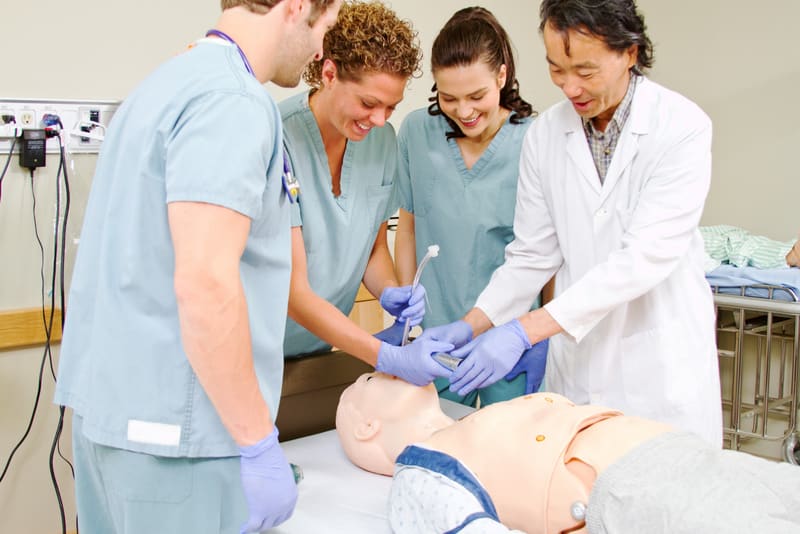4 Reasons to Study Nursing Instead of Medicine
You’ve decided to study healthcare, but which way do you go? Doctor or nurse? There are pros and cons to everything, but if you love working directly with patients, consider nursing. There are lots of reasons why—here are four. Let’s take a closer look.
- Student Tips

If you have the desire and stamina to work on a team of medical professionals while offering care and compassion to patients, consider a career in one of the medical field’s most rewarding professions: nursing.
You’ll have a wide range of activities from patient assessment, pre- and post-operation care, monitoring and administering of medication, working with patients to obtain samples, pulses, temperature, and blood pressure. You’ll also have the opportunity to wield your administrative skills by writing and maintaining records, supervising staff, managing workloads, and working with student nurses.
Another plus? You can work almost anywhere. Hospitals, homes, prisons, social agencies, health centers, schools, large companies, and small medical practices all need nurses. Don’t forget the opportunity to travel and work abroad; there’s a huge need for nurses on an international scale, too.
Why choose nursing over medicine? There are many reasons, but we’ll highlight four here.

1. Nurses are in demand.
The US Bureau of Labor Statistics reported that employment for registered nurses (RNs) is expected to increase by 16 percent through 2024. While nurses are in demand around the country—and the world—it depends on where you go.
Interesting tidbit: traveling nurses can help understaffed hospitals not just in the US, but around the world.
There’s a high demand for nurses around the country, but some nursing specialties have higher demand than others. Dialysis, emergency room, intensive care, labor and delivery, neonatal, and operating room nurses are in the highest demand right now. Interested? Read on.

2. Nurses spend quality time with patients.
Compared to the amount of time physicians spend with their patients, nurses spend exponentially more time with their patients—and get to know them in ways that doctors don’t.
Nurses are at a patient’s bedside from the time they enter a hospital, through admission to discharge. They work with patients to relieve pain, comfort, and handle unexpected reactions to treatment. Nurses who work in different settings have similar experiences working with patients—they follow a patient through all aspects of their care.
What does this mean? It means that nurses develop lasting relationships with their patients—ones that can make or break a patient’s experience of illness or injury.
Not only do nurses need intensive education (see #3), they also need the empathy and perception to work with patients daily.
Nurses don’t just take orders from doctors—they see their patients the most, are the first to notice when something isn’t right, and is the patient’s first line of defense.
A good nurse has a positive rapport with patients—and does what the patient needs, even if that means requesting a doctor’s orders.

3. The course of study is different—and less expensive.
Nursing study is intense, but a bit different from that of a doctor’s. To become a doctor can take eight to twelve years, and requires you to jump through hoops. Intelligence helps, but persistence helps more.
With nursing, the scope of study is different. Depending on the level of study, you can be a nurse in as little as two years. You still need intelligence and persistence, but you can work with patients more immediately.
There are three paths to nursing: an associate’s degree in nursing, A.D.N, which can take two to three years; a bachelor’s in nursing, or B.S.N, which takes four years; or a master’s degree in nursing, an M.S.N, which takes an additional two years after the B.S.N.
The more education you have in nursing, the greater the scope of your practice. The less education you have means that you will have to take more direct orders from your superiors.
Think about what you want to do and how you want to apply your education.
Cost plays a role, too. Physicians graduating from medical school have, on average, $160,000 in debt. Nursing programs vary. You can earn an A.D.N degree at a community college, a B.S.N at an undergraduate institution, and an M.S.N. typically at a larger university. These costs vary, but generally are less than the debt associated with medical school.

4. Medical model v. Nursing model: which one do you prefer?
Doctors and nurses work together to treat patients—but they have different ways of looking at things.
Here’s the basic difference: doctors are trained with a disease-oriented approach to patient care. The medical model focuses on the body as a complicated set of parts and systems. While medical schools are beginning to consider teaching cultural and lifestyle approaches to patient treatment, the medical model is an evidence-based approach to treatment based on patient history and symptoms.
The nursing model shares some similarities, but focuses more on a patient’s mental, emotional, and physical needs. The nursing model focuses more on the whole patient, not just the disease, or part of the patient that requires treatment.
Yes—there’s overlap, but there’s a difference.
Convinced that nursing is right for you? Weigh your options, assess your strengths and desires, and make the best choice. You will.
Read related articles

What You Should Know If You Want To Practice Medicine Abroad

Five Countries to Choose for Nursing Degrees
